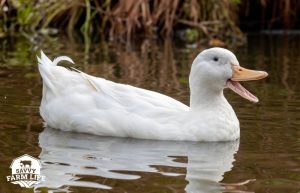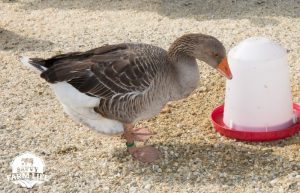
Do Ducks Need Water to Swim In?
Before I considered ducks for my farm, I had only ever seen them in the duck pond at the local park. I didn’t know whether ducks could live away from water or not. I had to start researching whether or not I would need a pond for my ducks or some alternative water source. In this article, I’ll share all I learned about ducks and their need for water.
Do ducks need water? Ducks require both swimming water and drinking water that needs to be kept clean in order to ensure good health. Besides drinking, ducks require a source of water where they can bathe as well as dunk their heads in order to keep their eyes and nostrils clear. As waterfowl, ducks also prefer water as a source of entertainment and leisure.
So, how much water do ducks need to bathe, hydrate, and have fun? Keep reading to learn more about the water requirements of ducks!
Why Do Ducks Need Water?
As waterfowl poultry, water is integral to both the mental and physical health of a duck. There are numerous important reasons ducks need water. Here’s what you need to know:
Ducks Need Water to Digest Their Food and to Stay Hydrated
Ducks need clean drinking water in order to swallow their food and feed properly. Adult ducks can drink up to a liter of water a day due to feeding habits. Ducks will grab a mouthful of food, then a mouthful of water to wash down the food. Without drinking water, they cannot swallow their food, so it is vital to a duck’s health to provide them with adequate amounts of clean water.
Ducks Need Water To Bathe In
Ducks like to preen and groom their feathers, specifically while they’re in the water. This keeps the feathers in good working condition while contributing to the duck’s overall cleanliness. Ducks can keep themselves free of parasites and mites by taking regular water baths, similar to how chickens can clean themselves by rolling in the dust.
In addition to this, ducks have a set of natural, water-wicking oils that coat their feathers to keep them from getting waterlogged after a swim. By submerging themselves in the water, they are able to distribute these oils, which are concentrated at the base of their tail, to the rest of their body. This helps provide them with a more effective natural barrier to water-logging.
Ducks will also dunk their heads in water to clear their eyes and nostrils from dust and debris. A duck that doesn’t have access to an adequate water supply can suffer from respiratory problems as they are not able to clear their airways.
Ducks Need Water For Enjoyment
Ducks are water birds; they love swimming in the water! They will often splash around or play in the water for their entertainment. A happy duck is one who has adequate access to clean “playing” water, which keeps them inherently healthy and satisfied.
Domesticated ducks that are not provided with access to recreational water supplies will become emotionally distressed and unhappy, which can lead them to become more vocal, sick, or depressed. The bottom line is that providing your ducks with a water source will keep them both physically and mentally healthy.
Ducks Prefer to Mate in the Water
Lastly, ducks prefer to mate on the water, so if you’re trying to breed within your flock, providing them with access to a pool or pond every day is necessary.
While ducks can mate on land, it’s kind of a last resort. By providing a safe and sanitary space for them to do their business, you increase your chances of getting more baby ducklings.
Ducks are prey animals, meaning it is in their nature to avoid danger. One way they do this is by staying in a flock. Ducks need to be kept with other ducks to feel safe. To learn more, visit my article Do Ducks Get Lonely? What You Need to Know.
How Much Water Do Ducks Need?
The answer to this question varies depending on the type of water you are discussing. Ducks need both clean drinking water and clean bathing water or recreational water to be happy. Ideally, these will be kept separate from each other to help the ducks learn that drinking water is NOT for splashing around in.
Drinking Water
As mentioned above, a duck can consume more a liter of water a day when eating and drinking. You can provide drinking water to them in a poultry waterer. Separating recreational water and drinking water will help to maintain cleanliness in water supply.
Recreational Water
As far as swimming water requirements go, ducks tend to be more flexible. The most important thing to remember when purchasing a pool or building a pond for your ducks to frolic in is that the water needs to be deep enough for them to bathe.
A good metric for recreational water for ducks is around 20-24cm (8-9.5 inches) deep, which gives the duck plenty of space to submerge its body and head under the water. Ducks need to clean their bills quite frequently, both during eating and after, so providing them with a safe, sanitary space to do this is vital to their wellbeing.
Do I Need a Pond For My Ducks?
Ducks are water birds, meaning they love to swim, play, and preen in sources of water. However, contrary to popular belief, having a pond is not a necessary requirement for having ducks. Most ducks will be happy with a kiddie pool or a large tub from a gardening supply store that’s filled regularly with freshwater.
What Pool Should I Get For My Ducks?
 One important thing to know when purchasing a tub or pool for your ducks is that they can drown if the pool is difficult for them to get out of. Ducks that cannot exit a pool safely will flail around until they eventually tire themselves out and drown.
One important thing to know when purchasing a tub or pool for your ducks is that they can drown if the pool is difficult for them to get out of. Ducks that cannot exit a pool safely will flail around until they eventually tire themselves out and drown.
To avoid this, all you need to do is get a pool with sloped edges and traction on the sides to help your ducks exit safely. Another tip is to supervise your ducks for the first few weeks that they are swimming in the water to make sure that they can exit safely. Once you know this for sure, it’s safe to let the ducks swim around without being watched.
Lastly, inflatable pools may seem like a good choice if you’re trying to watch your budget, but they are most certainly not. Ducks have sharp nails on their feet that can easily tear the plastic. If they don’t tear it trying to exit the pool, they may use their bills to bite at the shiny substance and rip holes in it for fun. It’s best to avoid inflatable pools for your ducks at all costs.
How much does it cost to own a duck? Get a complete overview by visit my article Duck Owning Cost: How Much It Costs To Own a Duck.
Water Cleanliness: How to Keep Your Duck Pool Clean
Ducks are not very clean birds; they like to frolic in the water and splash around, which soaks everything from the surrounding ground to the straw in their enclosures. Due to their simultaneous eating and drinking, they will often muddy or dirty their swimming and drinking water very quickly.
Change Your Duck’s Water Daily
Dirty water leads to unhealthy ducks and sickness, so it’s recommended that you change their swimming water daily, if not more depending on how quickly they dirty it. The best option is to place your duck enclosure and pond near an outside hose so you can quickly dump the putrid water on the ground, then refill the pool with clean water.
Invest in a Water Filter For Your Duck Pool
Another option is to invest in a filter for your duck pool or pond. A filter will work to remove debris and dirty water the pool and replace it with clean water. While you still may need to manually clean the duck pool on occasion, a filter is an effective way to maintain cleanliness for you ducks.
Separate Drinking Water and Swimming Water
One reason it’s a good idea to separate a duck’s drinking water from its recreational water is that bathing water can get very dirty very quickly. If a duck drinks dirty water, it has an increased risk of developing harmful infections or diseases.
Sometimes, ducks will even poop in their swimming water, and I certainly would not recommend giving poop water for your ducks to drink. It’s best to provide them with drinking water in a container or waterer that is easily discernible from their playing water.
You can buy ready-made duck waterers, or DIY them yourself, to keep the ducks from accessing their drinking water easily. Poultry waterers do not provide the space for a duck to dunk its head or bathe, so this will cause the duck to search for bathing water elsewhere. By separating drinking and swimming water, you’ll reduce the number of times you have to change their water in a day while protecting your ducks against harmful bacteria.
Do Ducklings Need Water to Play In?
Given that ducks are waterfowl, it would make sense that ducklings also need a small pool to bathe in, right? Wrong! Ducklings that are younger than one month old have not developed proper protection from the water and can become waterlogged or drown.
Ducklings do not produce the same oils that their adult counterparts do, meaning that they can’t wick away water after a swim. This, plus their fluffy feathers, can become waterlogged in ponds or pools, and contribute to them drowning or catching a cold from not being able to dry off after a swim. Once your ducklings are old enough, about a month old, it is perfectly safe to give them a shallow area to swim and play in.
It’s important to note, however, that ducklings still drink a lot of water, so they require access to clean drinking water just like adult ducks. In fact, four baby ducks can drink up to one gallon of water a day! They are certainly thirsty little fellows. Before they can swim, just make sure that you provide drinking water in a waterer so that they don’t accidentally drown in their drinking water.
Did you know that ducks like to sleep in the water as well!? To learn more, visit my article Where Do Ducks Sleep? Ultimate Duck Sleeping Behavior Guide.
